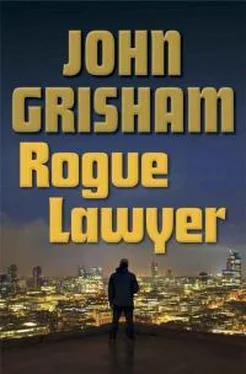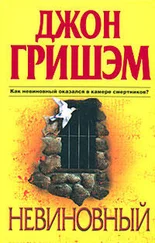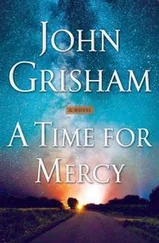The bailiff barks, I stand, Judge Kaufman enters, then we sit. Gardy refuses to stand in homage to the great man. Initially, this really pissed off His Honor. On the first day of trial—it now seems like months ago—he snapped at me, “Mr. Rudd, would you please ask your client to stand?”
I did, and he refused. This embarrassed the judge and we discussed it later in his chambers. He threatened to hold my client in contempt and keep him in jail all day long during the trial. I tried to encourage this but let it slip that such an overreaction would be mentioned repeatedly on appeal.
Gardy wisely observed, “What can they do to me that they haven’t already done?” So each morning Judge Kaufman begins the ceremonies with a long, nasty scowl at my client, who’s usually slouched in his chair either picking at his nose ring or nodding with his eyes closed. It’s impossible to tell which one of us, lawyer or client, Kaufman despises the most. Like the rest of Milo, he’s been convinced for a long time that Gardy is guilty. And, like everybody else in the courtroom, he has loathed me from day one.
Doesn’t matter. In this line of work you rarely have allies and you quickly make enemies.
Since he’s up for reelection next year, as is Huver, Kaufman slaps on his phony politician’s smile and welcomes everyone to his courtroom for another interesting day in the pursuit of the truth. Based on the calculations I made one day during lunch when the courtroom was empty, there are about 310 people sitting behind me. Except for Gardy’s mother and sister, everyone is fervently praying for a conviction, with a quick execution to follow. It’s up to Judge Kaufman to deliver. This is the judge who has so far allowed every word of bogus testimony offered by the State. At times it seems as though he’s afraid he might lose a vote or two if he sustains one of my objections.
When everyone is in place, they bring in the jury. There are fourteen people crammed in the box—the chosen twelve plus a couple of alternates in case someone gets sick or does something wrong. They are not sequestered (though I requested this), so they are free to go home at night and trash Gardy and me over dinner. Late each afternoon, they are warned by His Honor not to utter a single word about the case, but you can almost hear them yakking as they drive away. Their decision has been made. If they voted right now, before we offer a single witness in defense, they would find him guilty and demand his execution. Then they would return home as heroes and talk about this trial for the rest of their lives. When Gardy gets the needle, they will take special pride in their crucial role in finding justice. They will be elevated in Milo. They will be congratulated, stopped on the streets, recognized at church.
Still sappy, Kaufman welcomes them back, thanks them for their civic service, asks gravely whether anyone tried to contact them in an effort to gain influence. This usually prompts a few looks in my direction, as if I have the time, energy, and stupidity to slink around the streets of Milo at night stalking these same jurors so I can (1) bribe them, (2) intimidate them, or (3) plead with them. It’s now gospel that I’m the only crook in the room, in spite of the torrent of sins committed by the other side.
The truth is, if I had the money, the time, and the personnel, I would bribe and/or intimidate every juror. When the State, with its limitless resources, commences a fraudulent case and cheats at every turn, then cheating is legitimized. There is no level playing field. There is no fairness. The only honorable alternative for a lawyer fighting to save an innocent client is to cheat in defense.
However, if a defense lawyer is caught cheating, he or she gets nailed with sanctions by the court, reprimanded by the state bar association, maybe even indicted. If a prosecutor gets caught cheating, he either gets reelected or elevated to the bench. Our system never holds a bad prosecutor accountable.
The jurors assure His Honor that all is well. “Mr. Huver,” he announces with great solemnity, “please call your next witness.” Next up for the State is a fundamentalist preacher who converted the old Chrysler dealership into the World Harvest Temple and is drawing crowds to his daily prayer-a-thons. I watched him once on local cable; once is enough. His claim to fame here is that he says he confronted Gardy in the middle of a late-night youth service. According to his version, Gardy was wearing a T-shirt advertising a heavy metal rock group and conveying some vague satanic message, and this T-shirt was allowing the devil to infiltrate the service. Spiritual warfare was in the air, and God was unhappy with things. With divine direction, the preacher finally located the source of evil in the crowd, stopped the music, stormed back to where Gardy was sitting, and kicked him out of the building.
Gardy says he’s never been near the church. Further, Gardy claims he’s never seen the inside of any church in all of his eighteen years. His mother confirms this. As they say out here in the country, Gardy’s family is severely “unchurched.”
Why this is allowed as testimony in a capital murder case is thoroughly inconceivable. It is ridiculous and borders on stupidity. Assuming there is a conviction, all of this crap will be reviewed in about two years by a dispassionate appellate court two hundred miles away. Those judges, only slightly more intelligent than Kaufman but anything is an improvement, will take a dim view of this redneck preacher telling his trumped-up story about an altercation that supposedly took place some thirteen months before the murders.
I object. Overruled. I object, angrily. I’m overruled, angrily.
Huver, though, is desperate to keep Satan involved in his theory of the case. Judge Kaufman opened the gates days ago and anything is welcome. However, he’ll slam them as soon as I start calling witnesses. We’ll be lucky to get a hundred words into the record.
The preacher has an unpaid tax bill in another state. He doesn’t know I’ve found it, and thus we’ll have some fun on cross-examination. Not that it will matter; it will not. This jury is done. Gardy is a monster who deserves to go to hell. Their job is to speed him along.
He leans over long enough to whisper, “Mr. Rudd, I swear I’ve never been to church.”
I nod and smile because this is all I can do. A defense lawyer cannot always believe his clients, but when Gardy says he’s never been to church, I believe him.
The preacher has a temper and I soon stoke it. I use the unpaid tax bill to really irritate him, and once he’s pissed he stays that way. I lead him into arguments over the inerrancy of scripture, the Trinity, the apocalypse, speaking in tongues, playing with snakes, drinking poison, and the pervasiveness of satanic cults in the Milo area. Huver yells objections and Kaufman sustains them. At one point the preacher, pious and red-faced, closes his eyes and raises both hands as high as possible. Instinctively, I freeze and cower and look at the ceiling as if a lightning bolt is coming. Later, he calls me an atheist and says I’m going to hell.
“So you have the authority to send folks to hell?” I fire back.
“God tells me you’re going to hell.”
“Then put Him on the loudspeaker so we can all hear.”
Two jurors actually chuckle at this. Kaufman has had enough. He raps the gavel and calls for lunch. We’ve wasted the morning with this sanctimonious little prick and his bogus testimony, but he’s not the first local to wedge himself into the trial. The town is filled with wannabe heroes.
4.
Lunch is always a treat. Since it’s not safe to leave the courthouse, actually the courtroom itself, Gardy and I eat a sandwich by ourselves at the defense table. It’s the same box lunch fed to the jurors. They bring in sixteen of them, mix them up, draw ours at random, and take the rest to the jury room. This was my idea because I prefer not to be poisoned. Gardy has no clue; he’s just hungry. He says the food at the jail is what you’d expect and he doesn’t trust the guards. He eats nothing there, and since he’s surviving only on lunch, I asked Judge Kaufman if the county could perhaps double up and give the boy two rubber chicken sandwiches, with extra chips and another pickle. In other words, two box lunches instead of one. Denied.
Читать дальше












